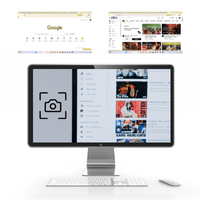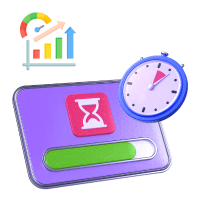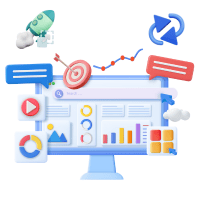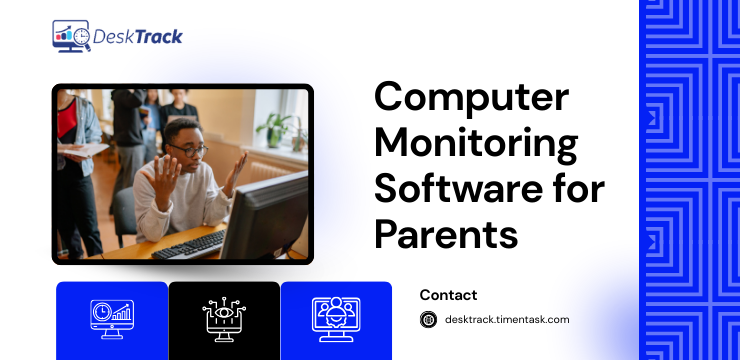Team management is easy. Anyone can manage a team or multiple teams. However, doing it effectively is not everyone’s cup of tea. So, in today’s blog post, we will make it yours. Based on our experience and expertise, we will provide you with useful insights to be a better team manager or leader.
Especially in 2025, due to the rapidly changing and innovating work world, managing teams has become even more complex. So, you need to be equipped with all the knowledge and skills to lead your teams to success. Especially if you are a new manager. Otherwise, your teams will manage you instead of the other way around.
By the end of today’s blog, you will have your head wrapped around what team management is, its types, the difference between a leader and a manager, the skills required, and a lot more. With that out of our way, let’s get started right away with it.
What is Team Management?
To manage a team is your ability as a manager to carry out and coordinate an entire team or teams to execute their tasks and common objectives. Here, you need to support your teams via:
- Coordination
- Active listening
- Motivation
- Fostering a positive work environment
All this is needed to help each team member complete their daily tasks. In 2025, the mandatory requirement for maximum efficiency here is to use the right project management software. The software solution also helps teams and managers manage projects in an efficient and organized way.
Read Also: How to Manage Freelancers Like a Pro: Tools, Tips & Tactics in 2025
The Key Differences Between Team Managers & Team Leaders
Although the responsibilities of both of these may fall on the same human resource, there are certain key differences between these roles that you need to know:
| Key Point | Team Managers | Team Leaders |
| Tasks | Manages daily tasks within their team or teams, ensuring that team members understand and correctly execute workflows. | Don’t focus on daily tasks. Their concentration is always on the vision of the larger objectives, the organization wants to achieve. |
| What do they ensure? | Keeps teams organized and on the same page to ensure that the team’s or teams’ objectives are achieved. | Ensures that their team or teams are aligned with the vision of your organization and inspires employees to work towards reaching it. |
The 8 Categories of Team Management
Make your workday more productive
Time tracking and work management can help you reach your goals
faster.
When it comes to steering the direction of your teams on the right track as a manager, there are different types out of which you can adopt one as per your preference, organizational requirements, and management style.
However, remember that the category of team management you choose will determine your approach to directing your team or teams. The category decides the team-building activities, your approach to delivering feedback and evaluations, and everything else that’s related. Commonly, you will see these management brackets at workplaces.
|
When you make all decisions solo. That is, all by yourself, without much input from team members. |
|
It’s the same as democracy. You allow your team members to provide opinions and insights, participating in decision-making, creating a sense of shared responsibility. |
|
Here, you allow your staff members to work independently. You only chip in when it’s needed the most. |
|
Here, you inspire and motivate your human resources to reach extraordinary results via change and innovation. |
|
Your focus is on providing clear instructions and tasks to team members. Plus, you reward good work and penalize employees for not-so-good work. |
|
Your focus is on the growth of individual team members. You need to assist them in growing and developing as much as possible. |
|
Your only job here is to facilitate team coordination. On the other hand, your teams only focus on working together and making collective decisions. |
|
It’s as simple as that. You act as a coach. (Not the coach from Chak De India, though). Thus, your role is to provide guidance, support, and feedback. The idea here is to skyrocket the skills of your employees to the next level while neither being too harsh nor too soft. |
10 Key Skills Required for Effective Team Management in 2025
Remember that your team’s or teams’ performances are directly proportional to the level of your managerial skills. You must know that as a manager, it’s hard to manage the demands and fulfill the goals and deliverables of the organization you work with while still being true and loyal to your team, supporting the individual requirements of each team member.
You need to strike the right balance by learning and elevating the right team management skills. Here’s what you need to master:
- Strong communication and active listening skills
- A growth mindset for both the team members and the organization
- Goal setting and performance management
- Time management
- Delegating tasks to the right employees
- Decision-making and problem-solving
- Leadership that motivates and guides team members
- Understanding and empathy
- Conflict resolution
- Adaptability
3 Benefits of Effective Team Management

Effectively managing your team or teams is beneficial for you and your organization only. Besides making a positive work environment and ensuring that all team members are aligned with the objectives, there are also other advantages you get from mastering how to manage teams effectively. To start with, here are 3 pros.
1. Happier Employees
Did you know that, as per studies, happier employees lead to organizations outperforming their competition by 20%. So, as a team manager or leader, your role is to ensure that your employees and team members feel good about working in your organization. Why? Because it will have a positive impact on your business’s success. Plus, the customer service delivered is also of higher quality, leading to more loyal and satisfied customers:
- Encourage feedback from your staff and follow through by making it count.
- Prioritize work-life balance. You can either follow a flexible work schedule or encourage your employees to clock out on time.
- You need to be transparent with your employees.
2. Employee Productivity Skyrockets
Did you know that according to an expert survey, employees who are highly engaged are 18% more productive? Effective team management leads to an organizational culture where employees are more successful. You see, making a positive work culture and atmosphere leads to a workplace where employees are more engaged over time:
- It’s a good option to discuss and define goals together so that your employees know what’s essential for your organization before deciding what’s crucial work and what’s not.
3. Reduced Employee Turnover
Talking with facts and figures, the expense of replacing a human resource can range from ½ to even *2 of their salary. Overall, this is the most significant reason for you to master how to effectively manage your teams:
- Determine if new employees would fit your organization’s culture by asking questions related to the hires’ values or interpersonal skills, and assess whether they would fit in your teams or not.
- It’s good to hire slowly. Rushing to fill a vacant position may skyrocket the chance of hiring someone who is not good enough.
- It’s a good idea to have your candidates converse with the team members first to identify whether they would be able to blend in or not.
Read Also: Top 10 Client Management Software in 2025
The 6 Career Paths in Team Management

Even if you don’t want to master how to effectively manage teams, particularly, wrapping your head around team management skills mastery can lead to various amazing career opportunities for you. All you have to do is gain technical skills and experience in this field:
- Project Manager: Your role is to coordinate tasks, resources, and timelines.
- Operations Manager: Your job will be to manage daily operations in the organization to ensure efficiency.
- Team Leader: The role is to lead, guide, and support teams in a department.
- Product Manager: Your job will be to manage the entire lifecycle and development of all the products by coordinating different teams.
- Human Resources Manager: Your job will be to manage employee relations, recruitment, and professional development.
- Customer Service Manager: Your role is to coordinate and collaborate with customer service teams to enhance customer satisfaction by solving issues.
7 Proven Tips for Effective Team Management in 2025
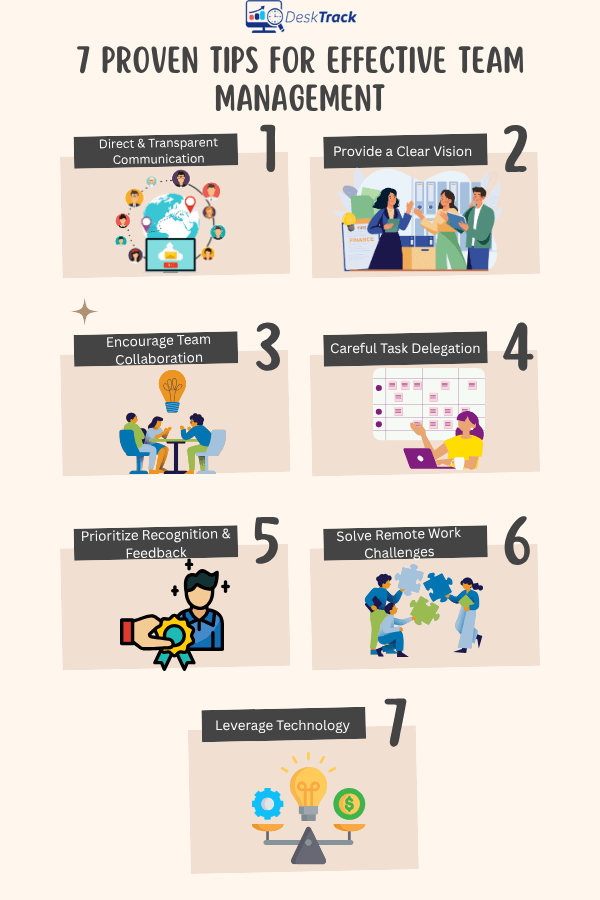
If you want to be effective at team management, then these expert (we) recommended tips will come in handy for you. Overall, what we want to say is that these worked for our managers and will work as good or even better for yours. So without the wait, let’s get straight into the insightful details that you probably need to be a better manager or team leader.
1. Direct & Transparent Communication
Miscommunication is a dread and a threat to higher employee work productivity. Employees hate it as it causes chaos, confusion, and stress. For instance, using collaboration features in a social media post scheduler for clear communication during a social media content strategy. Overall, it allows a team or teams to concentrate on their collaboration, efficiency, and productivity.
2. Provide a Clear Vision
As a manager, keeping your human resources on track is an essential part of your job role. If you don’t keep your eyes on the ball, you can forget ensuring that your team or teams move in the right direction. The best thing to do here is to set a transparent vision, highlighting short-term and long-term project objectives. Overall, it’s a good way to maintain the flow of work and keep track of different tasks.
3. Encourage Team Collaboration
Your employees must also feel connected to your organizational culture and their teams. As we mentioned before, or not, effective collaboration is crucial for your employees and teams to get things done together on time, and with no conflict.
For the same, you can use collaboration software as a manager. These solutions with a customizable project tracking template can help you and your teams:
- Set up projects
- Track tasks
- Monitor deadlines
- Send and receive notifications
- Make changes quickly
4. Careful Task Delegation
As a manager, your organization expects you to assign tasks to employees based on their skills, experience, and competency. Plus, you must also have trust that your human resources can complete their tasks on time.
To be precise, every team member should have a fair workload, but according to our research, 21% of employees feel overwhelmed with their workload most of the time. A brilliant solution to this problem is to use workflow automation, for example:
- With the right software, new tasks arriving are automatically assigned to team members.
- This is based on parameters, such as current workload, region, expertise, and others.
- You can also use a team task management template to delegate tasks by easily spotting the capacities of team members and making changes to reduce heavy workloads.
5. Prioritize Recognition & Feedback
This is useful and insightful for your employees as well as managers. Constructive feedback sessions provide you with useful insights into areas for improvement. It provides your employees with transparency regarding where they stand and where they are headed:
- Listen to what your employees are saying and, if possible, act on it.
- Any changes that these feedbacks inspire can help you and your employees perform better and build trust.
- Another important aspect of feedback sessions is recognition.
- Remember that appreciating the efforts and achievements of employees can significantly skyrocket employee morale. On the other hand, if there are no recognition or rewards, it can and will lead to burnout.
What you can do is use employee scheduling software to easily schedule and manage feedback sessions from a single dashboard.
6. Solve Remote Work Challenges
To effectively handle a remote team, you, as a manager, must identify and solve the issues of hiring and managing virtual team members. Some common challenges include scheduling and miscommunication.
A simple yet effective solution is to note all information from new hires to team activities on a single dashboard using employee monitoring software. A few more things to never forget are:
- Regular and ongoing feedback can do a lot to engage employees. Especially when they are remote and find it hard to connect.
- As per our research, employees who receive daily feedback as opposed to annually, feel 3.6 times more inspired.
7. Leverage Technology
As we keep mentioning time and again, or not, leverage technology as much as you can to effectively manage your teams and their tasks. From the right employee monitoring to time tracking software, every tool implemented into a single platform assists you a lot in steering your teams on the right track.
Manage More Than Your Teams with DeskTrack
The capabilities of DeskTrack go beyond team management. Primarily, it’s a productivity management software solution. However, the one with every feature you need to manage everything related to your employees. From making the work-time utilization effective to preventing insider threats, the software solution covers it all with these features:
- Real-time tracking with data analytics
- Real-time screenshot monitoring
- Application, URL, and file usage monitoring, and more
Conclusion
Now, we hope that you have wrapped your head around effective team management and the benefits that come with it. As a final word, we can say that anyone can manage a team or teams. It’s no big deal. However, when it comes to effectively doing it, only a few exceptional ones succeed at it. What makes the better ones different is that they are equipped with all the skills, knowledge, and expertise needed to lead a team to success. With a little insight, any manager can be a good manager, the good ones great, and so on. Plus, to help you use your managerial skills even better, we have the best employee monitoring and management software. DeskTrack has every best feature needed to assist you in skyrocketing the efficiency and productivity of your staff.
Frequently Asked Questions (FAQ)
Q. What is Team Management?
Ans. To direct human resources to success is your ability as a manager to carry out and coordinate an entire team or teams to execute their tasks and common objectives.
Q. What are the Types of Team Management?
Ans. These are the different approaches to managing teams.
- Autocratic Management
- Democratic Management
- Laissez-Faire Management
- Transformational Management
- Transactional Management
- Servant Leadership
- Collaborative Management
- Coaching Management
Q. What are the 4 Cs of Team Management?
Ans. You need to know about these 4Cs to effectively manage your teams.
- Clarity
- Commitment
- Contribution
- Concerns
Q. What Skills Do You Use to Manage Your Team?
Ans. You will need these 10 skills to effectively manage your teams and employees.
- Strong communication and active listening skills
- A growth mindset for both the team members and the organization
- Goal setting and performance management
- Time management
- Delegating tasks to the right employees
- Decision-making and problem-solving
- Leadership that motivates and guides team members
- Understanding and empathy
- Conflict resolution
- Adaptability
Q. What are the Benefits of Effectively Managing Your Teams?
Ans. You will experience these 3 key but significant benefits if you are successful at effectively managing your team members.
- Happier Employees
- Employee Productivity Skyrockets
- Reduced Employee Turnover













